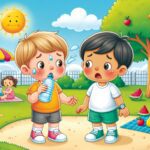Identifying signs of dehydration in exclusively breastfed babies is a crucial aspect of infant care that every parent and caregiver needs to understand. Due to their unique dietary source, exclusively breastfed babies may exhibit different signs of dehydration compared to their formula-fed counterparts. This article dives deep into how to recognize dehydration, its potential causes, and effective prevention strategies.
Recognizing Signs of Dehydration in Exclusively Breastfed Babies
Exclusively breastfed babies might not show immediate obvious signs of dehydration, making vigilance important. Some key indicators include fewer wet diapers than usual (less than six in 24 hours), dark yellow urine, a dry mouth, lethargy, and a sunken soft spot on the head. Understanding these signs is the first step in preventing dehydration and ensuring your baby remains healthy.
Another critical sign is weight loss or failure to gain weight, which can be subtle and gradual. Regular check-ups with your pediatrician can help monitor your baby’s weight gain and hydration status effectively. Additionally, a baby who is dehydrated might cry without tears and seem unusually sleepy or irritable.
Causes and Prevention of Dehydration in Exclusively Breastfed Babies
Several factors can contribute to dehydration in exclusively breastfed babies, including inadequate milk intake, a mother’s low milk supply, or breastfeeding difficulties. Sometimes, the hot weather can also increase the risk. Understanding these causes is crucial for prevention.
Ensuring that the baby is properly latched and feeding effectively is vital. If you’re concerned about your milk supply or your baby’s feeding technique, consulting a lactation expert can provide invaluable guidance. Additionally, keeping the baby cool and comfortable during hot weather and offering the breast more frequently can help maintain hydration.
For more in-depth guidance on improving your milk supply, consider reading Breastfeeding Tips for Mothers with Low Milk Supply.
When to Seek Medical Advice for Dehydration
If you notice any signs of dehydration in your exclusively breastfed baby, it’s important to act swiftly. While mild dehydration can often be addressed at home by offering more frequent breastfeeding sessions, severe symptoms such as listlessness, deep rapid breathing, or a very dry mouth necessitate immediate medical attention.
It’s always better to err on the side of caution. If you’re unsure about your baby’s hydration status, consulting a pediatrician can provide peace of mind and potentially prevent complications. Early intervention is key to managing dehydration effectively.
Dehydration in exclusively breastfed babies can be concerning, but with the right knowledge and attentiveness, it’s preventable. Recognizing the signs early and understanding when to seek help are essential steps in caring for your baby’s health. For more resources on breastfeeding and baby care, visit Hydration Tips for Breastfeeding Mothers and Identifying and Managing Food Allergies in 8-Month-Olds.
Ensuring your baby stays hydrated is a daily task that requires attention and care. By staying informed and vigilant, parents can prevent dehydration and support their baby’s health and well-being.













